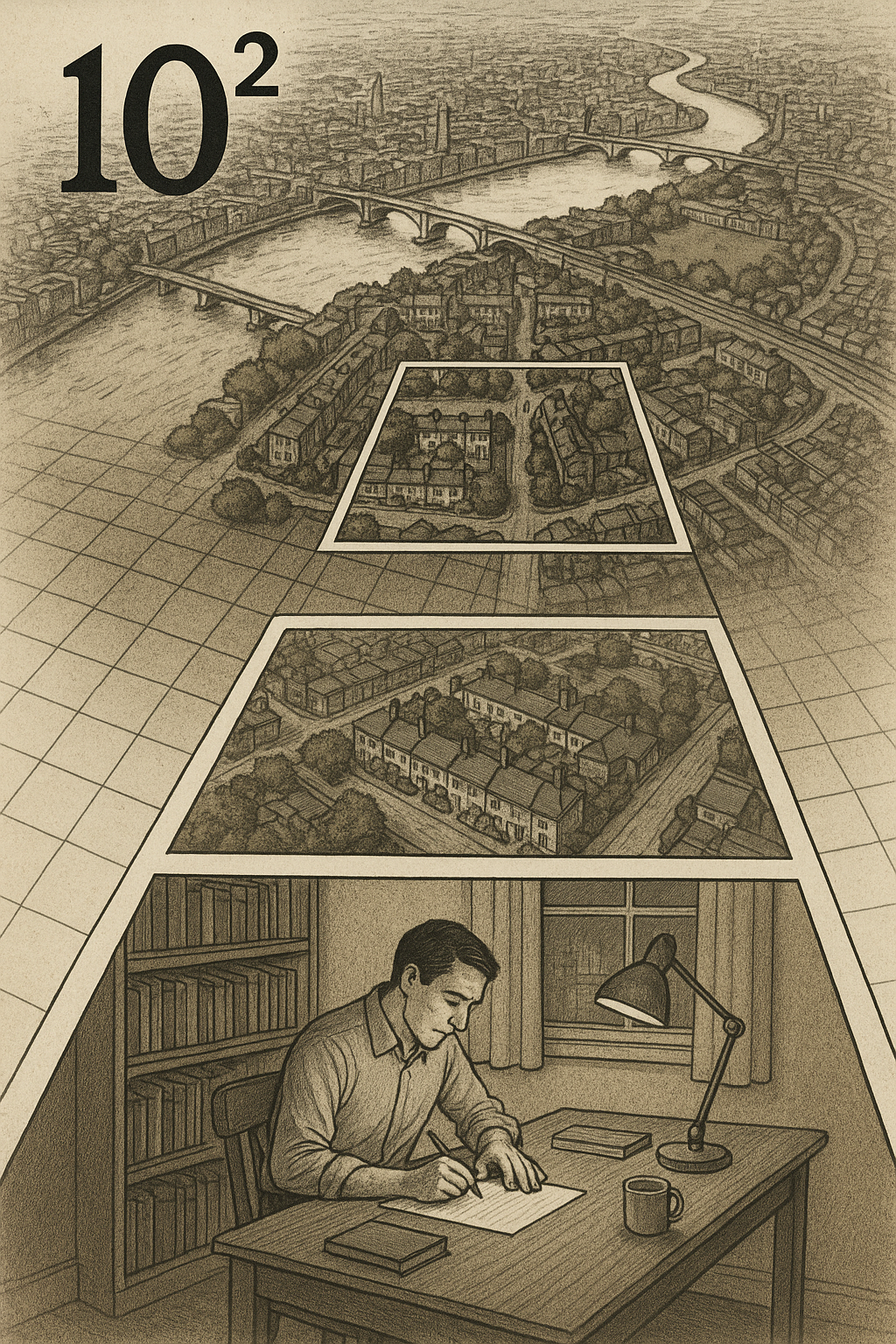Ghostwriting and Powers of Ten
There is a short film called Powers of Ten about the relative size of the universe. It begins with a man lying on a rug in the sun. The camera pans out until the planet is barely distinguishable. It continues further, showing the whole solar system, the Milky Way, the outskirts of the galaxy, and then beyond one million light years where galaxies merge into flecks of light, and then the image fades into the darkness, at the edge of vision. A lonely and silent expanse.
The camera then reverses. It zooms back at speed, returning to the man on the rug, then into his sleeping hand. It passes through the skin, into the blood vessels, the cells, deeper into the collagen, into a lymphocyte, then the nucleus. DNA spirals appear, electrons shimmer and spin in quantum motion. From outer electrons to the inner ones, we are plunged again into space—a vast inner world until, eventually, we reach the edge of current understanding. Space without, and space within, the limits of which are both unknown.
When I meet with a new client—in their flat or house, or online—I am, in essence, viewing the man on the rug. I begin by observing the aesthetics of a life: a choice of attire, the colour and pattern of a rug, the light in a room. But my true role is to be the lens for that cosmic camera to be able to pan in and out. To reveal what lies at the core of a person. What makes their electrons spin. What renders them isolated in their own universe, or connected to others. How far do they extend outward, into the world? How much have they shaped outer reality?
As I’ve written before, there are distinct overlaps between psychotherapy and ghostwriting. Quite often, elderly clients haven’t had anyone to open up to about the entirety of their lives. The family is busy. Friends absent. But naturally, memory lingers. It begins in fragments, then comes flooding in, pushing against the dam of the polite and the impersonal. Soon, the client speaks quickly, recounting decades in a rush, as though time itself had bent to accommodate the need to remember.
From the dark matter of old age, they become enlivened—a quiet star sedately imploding. They speak of regrets, lost opportunities, the paths that seemed senseless at the time but later took on meaning. The wrong turnings. The right ones, glowing faintly like stars seen from a mountaintop on a clear night. And then come the confessions:
“And then he left, taking only his toothbrush after twenty years of marriage.” “She died, right after I’d retired and we’d moved country.” “The love of my life wanted me back, just after I’d remarried.”
Suddenly, the tastefully decorated flat is no longer ordinary. Its walls recede. The facade drops. We are not in London anymore, not really. I am in deep space, isolated with a person who kept going when the vacuum threatened to suffocate. A person who rebuilt their universe from the ashes of an obliterated star. Who has survived to burn brightly again. Who sits now in front of me—no longer ordinary, but improbably wise. A sage almost worthy of worship.
The facade, of course, is both necessary and deceiving. To be human is to make gestures toward appearance. Yet underneath lies the truth: suffering, near-enlightenment, resilience. Stars collapse. Black holes form. Light survives. And I am let in to witness it. To see that in life we go outward as much as we go inward. And in the end, all that remains is the story.
A universe compressed into a book. Pages filled with miracles, if you peer close enough—or zoom far enough out that is.
To be a ghostwriter in London is to dwell in the impersonal, just to get by. To walk streets lined with eclectic architecture. Shades, styles, mannerisms, accents, all layered like sediment. A living collage of origins and adaptations. But when I cross the threshold into someone’s home, when small talk gives way to story, the lens begins its work. In and out. Closer. Wider. Until what was once an ordinary life becomes a cosmos. Whole. Visible. Recorded as accurately as I am able.
That’s the privilege. To be the one through whom it is all observed.

